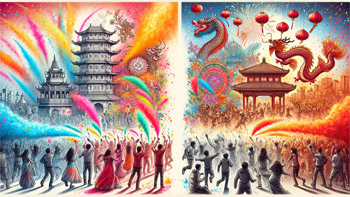Cultural festivals are vibrant tapestries that showcase the rich and diverse fabrics of societies around the globe. These events, ranging from traditional to contemporary, are not just celebrations; they are a deep dive into the soul of a culture, telling stories of heritage, history, and communal values. They offer a unique insight into the customs and traditions that have been shaped by centuries of history and are a testament to the enduring spirit of human creativity and sociability.
The Significance of Cultural Festivals
Cultural festivals go beyond mere entertainment; they are a powerful means of expressing collective identity and social cohesion. They serve as a platform for communities to pass down traditions, stories, and customs from one generation to the next, ensuring that their cultural heritage is not lost in the sands of time. These festivals also act as a bridge, connecting people from different walks of life, fostering understanding, tolerance, and appreciation of the diverse world we live in.
World-Famous Cultural Festivals
The Rio Carnival in Brazil is a burst of color and energy, showcasing the country's love for samba dance and music. Spain's La Tomatina is another unique celebration where participants joyfully engage in a tomato-throwing frenzy. Not to be outdone, the Chinese New Year, or Spring Festival, marks the beginning of the lunar new year with fireworks, dragon dances, and family reunions. These festivals are just a few examples of the myriad ways in which different cultures celebrate their heritage. Additionally, the Oktoberfest in Germany offers a lively atmosphere with its world-famous beer and traditional Bavarian music, drawing visitors from all over the globe. The Venice Carnival in Italy, known for its elaborate masks and costumes, transports participants back in time, celebrating history and artistry in a city renowned for its romantic canals. In India, the vibrancy of Holi, the festival of colors, symbolizes the triumph of good over evil and ushers in the spring season with a splash of color and joy. The Edinburgh Festival Fringe in Scotland, the world's largest arts festival, showcases a range of performances from theatre to comedy, providing a platform for artists from various backgrounds. These festivals, each with their distinct charm and traditions, not only highlight the cultural richness of their respective countries but also create a global platform for the exchange of cultural experiences, fostering a sense of unity and shared human heritage. Through these celebrations, attendees are given a window into the heart of each culture, revealing the stories, passions, and artistic expressions that have been shaped and passed down through generations.
Traditions and Rituals
At the heart of each cultural festival are the traditions and rituals that define it. In India, Diwali, the festival of lights, is celebrated with the lighting of lamps, symbolizing the victory of light over darkness. In the United States, Thanksgiving is a time for families to gather and express gratitude, marked by a feast that includes the traditional turkey dinner. Each ritual, whether it be a dance, a ceremonial practice, or a special meal, is imbued with meaning and significance that resonates deeply with the participants.
Cultural Festivals as Tourist Attractions
Beyond their cultural significance, these festivals have become major tourist attractions. They offer travelers an immersive experience, a chance to witness and participate in celebrations that are vastly different from their own. Tourism associated with cultural festivals not only boosts the local economy but also promotes cultural exchange and global understanding. Events like Oktoberfest in Germany and the Edinburgh Festival Fringe in Scotland attract visitors from all corners of the world, eager to partake in these unique cultural experiences.
The Impact of Globalization on Cultural Festivals
Globalization has had a profound impact on cultural festivals. While it has facilitated the exchange of cultural practices, allowing festivals to gain international recognition, it has also posed challenges. There is an ongoing debate about the commercialization of these festivals and the potential loss of their authentic cultural essence. However, the resilience of these cultural events lies in their ability to adapt while maintaining their core values and traditions.
Cultural Festivals in the Digital Age
In the digital age, cultural festivals have found new ways to reach audiences. Social media and digital platforms have allowed these events to be broadcasted and experienced virtually, breaking geographical barriers. This digital transition not only keeps the festival spirit alive during times when physical gatherings are not possible, such as during the COVID-19 pandemic, but also opens up new possibilities for how cultural celebrations can be shared and enjoyed worldwide.
In essence, cultural festivals are much more than occasions for joy and revelry. They are profound expressions of human culture, embodying the rituals, traditions, and stories of communities. They serve as reminders of our shared humanity and the diverse beauty of our world. As we participate in or learn about these festivals, we become part of a larger narrative, one that celebrates the richness of human culture and the unifying power of communal celebration.
